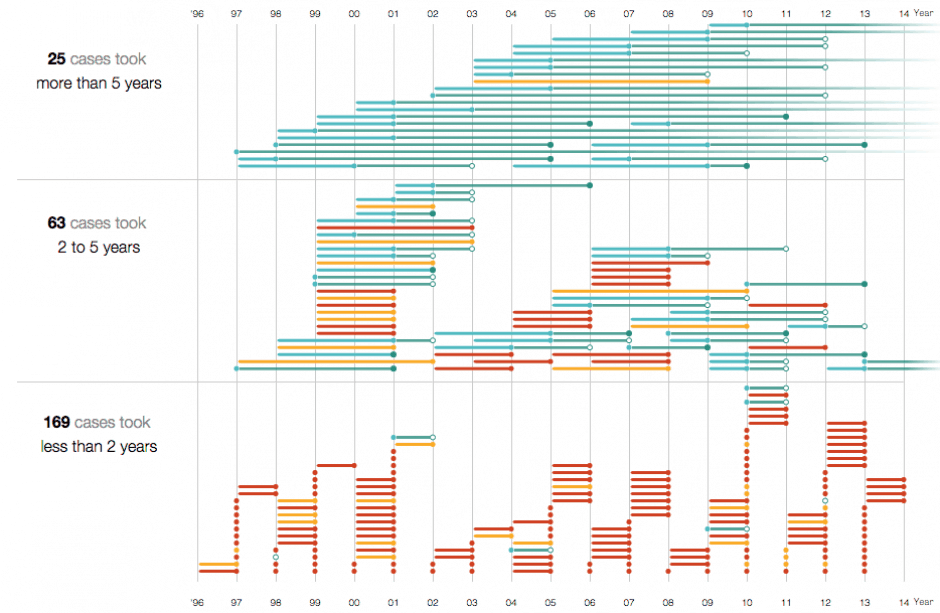Introduction
As part of our investigation of the U.S. Environmental Protection Agency’s Office of Civil Rights, we submitted a Freedom of Information Act request to the agency asking for complaint and resolution letters for every case of alleged environmental discrimination from the mid-1990s until the date the request was processed. The EPA did not respond to a follow-up request seeking documents from cases dating to 1993, when the office began processing environmental discrimination complaints.

The Center for Public Integrity cross-referenced the data received with that included in the EPA’s online database and found missing cases, inaccurate dates and other discrepancies. For example, in some instances, the Center received complaints with case numbers but the cases weren’t listed on the EPA website. In others, the EPA database showed cases as pending even though the Center had documents indicating they had been resolved. In still others, the EPA reported receiving cases days or weeks before they were actually filed.
The Center sought to standardize the data and make the records we received as accurate and complete as possible.
We began by entering into our own database case information gleaned from more than 500 documents. If cases were missing data or final outcomes previously published by the EPA, the Center included that information. When information in the EPA’s database differed from the information we had in case files, we went with the latter. For consistency, the Center categorized the adjudication of cases as follows:
- Denied: Cases that did not pass a jurisdictional review because they missed the 180-day time limit; the agency targeted in the complaint didn’t receive EPA funding; or the complaint didn’t describe an act covered by Title VI of the Civil Rights Act of 1964.
- Dismissed: Cases that were accepted for investigation, but in which the EPA did not find a discriminatory act; cases that were put on hold or dismissed due to concurrent pending litigation.
- Closed: Cases that were withdrawn by the complainant, referred to another federal agency with subject-matter expertise, or resolved through an agreement or settlement with the target of the complaint.
- Pending: Cases that are awaiting jurisdictional review or final outcome.
In calculating whether the Office of Civil Rights met a 20-day deadline to determine jurisdiction over cases, the Center used either the date the complainant was notified of the outcome or the date the EPA first reached out to the complainant for clarifying information about the case. We felt this was the best representation of when the EPA took action on a case, given that the agency had no control over when or if a complainant chose to reply.
Additionally, when calculating how long cases took to wind through the review process, the Center omitted those that were pending, so as not to skew the results.
Allegations of environmental discrimination comprise only a sliver of the civil-rights office’s enforcement mandate. The office also investigates claims of discrimination based on sex and disability, and internal complaints filed by EPA employees.
Read more in Environment
Environment
Hot mess: states struggle to deal with radioactive fracking waste
Potentially dangerous drilling byproducts are being dumped in landfills throughout the Marcellus Shale with few controls
Environment
Side benefit of climate accord: Better health in polluted communities
Areas besieged by smog and other toxic emissions could benefit from the pact approved Saturday



Join the conversation
Show Comments